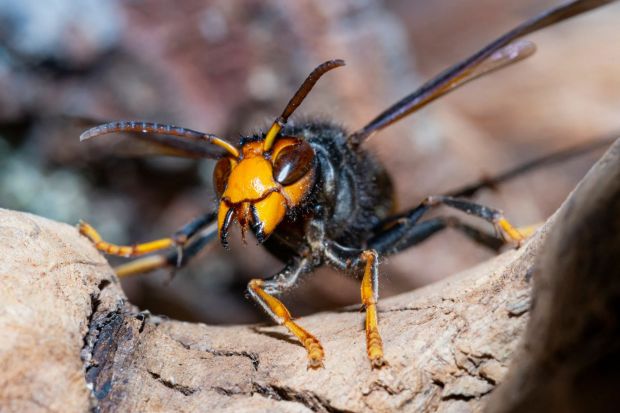Top Stories
Urgent Alert: Asian Hornet Sighted in Ireland, Threatens Bees

UPDATE: An Asian hornet has been spotted and captured in Co Cork, Ireland, raising urgent alarms for local honeybee populations and biodiversity. This invasive predator, first identified in Europe in 2004, poses a significant threat as it is known to “wreak havoc” on honeybee colonies, which are crucial for pollination.
The sighting was confirmed on Tuesday, prompting immediate action from authorities and environmental groups. Colette O’Connor, Director of the Irish Beekeepers Association, expressed deep concern: “We’re very, very concerned because this insect is a carnivore. It’s an apex predator. It will wreak havoc.”
Reports indicate that previous infestations in Europe have cost beekeepers nearly €8 million in protective measures, with many giving up beekeeping entirely due to the hornet’s devastating impact. O’Connor emphasized that while only one hornet has been confirmed, its presence could indicate a larger issue, as these pests are adept at traveling through human activity.
The Department of Housing, Local Government and Heritage has echoed these concerns, labeling the Asian hornet as a “significant threat to biodiversity in Ireland.” A new task force, the Asian Hornet Management Group, will be established, chaired by the National Parks and Wildlife Service (NPWS), to coordinate responses and monitor potential threats.
In light of this situation, officials are urging truck drivers, port workers, and travelers to be on high alert, as the hornet is known to hitch rides on vehicles and ferries. This is the second confirmed sighting in Ireland, with a previous hornet captured in 2021 in Dublin.
WHAT TO LOOK FOR: The Asian hornet can be identified by its large, dark body with yellow-tipped legs and a distinct yellow-orange stripe near the end. Their nests resemble large grey paper footballs, often found high in trees or in sheds. Beekeepers should be particularly vigilant, as the hornet shows unusually high activity around beehives.
These hornets pose a greater risk with their painful stings, which can be lethal for those allergic. Unlike honeybees, they can sting multiple times, injecting more venom with each sting. In severe cases, stings can cause anaphylaxis, requiring immediate medical attention.
Christopher O’Sullivan TD, Minister of State for Nature, Heritage, and Biodiversity, emphasized the importance of early detection in combating this invasive species. “This incident shows us that members of the public are our eyes on the ground. Early detection is key to prevent the establishment of this invasive species,” he stated.
He urged everyone to stay vigilant and report any sightings of the Asian hornet immediately. As the situation develops, authorities will rely heavily on public cooperation to protect Ireland’s native pollinators and overall biodiversity.
In conclusion, the sighting of the Asian hornet in Co Cork serves as a critical reminder of the threats posed by invasive species. Residents are encouraged to remain alert, document any sightings with photos, and report them to local authorities to assist in containment efforts. This is a developing story; stay tuned for updates as the situation unfolds.
-

 Entertainment2 weeks ago
Entertainment2 weeks agoAimee Osbourne Joins Family for Emotional Tribute to Ozzy
-

 Politics3 weeks ago
Politics3 weeks agoDanny Healy-Rae Considers Complaint After Altercation with Garda
-

 World4 weeks ago
World4 weeks agoHawaii Commemorates 80 Years Since Hiroshima Bombing with Ceremony
-

 Top Stories4 weeks ago
Top Stories4 weeks agoFianna Fáil TDs Urgently Consider Maire Geoghegan-Quinn for Presidency
-

 World4 weeks ago
World4 weeks agoGaza Aid Distribution Tragedy: 20 Killed Amid Ongoing Violence
-

 World4 weeks ago
World4 weeks agoCouple Convicted of Murdering Two-Year-Old Grandson in Wales
-

 World1 month ago
World1 month agoAristocrat Constance Marten and Partner Convicted of Infant Murder
-

 Top Stories1 month ago
Top Stories1 month agoClashes Erupt Between Far-Right Groups and Migrants in Spain
-

 Top Stories4 weeks ago
Top Stories4 weeks agoHistoric Dalkey Pub The Queens Reopens Under New Management
-

 World1 month ago
World1 month agoTrump Defends FBI Deputy Director Amid Epstein Files Controversy
-

 Business1 month ago
Business1 month agoSunshine 106.8 Boosts Irish Music After Regulator’s Request
-

 Politics4 weeks ago
Politics4 weeks agoTragic Crowd Surge at Gaza Aid Center Claims 20 Lives









